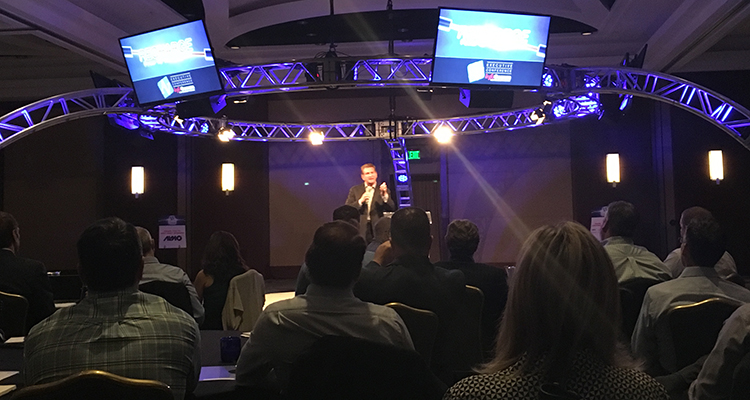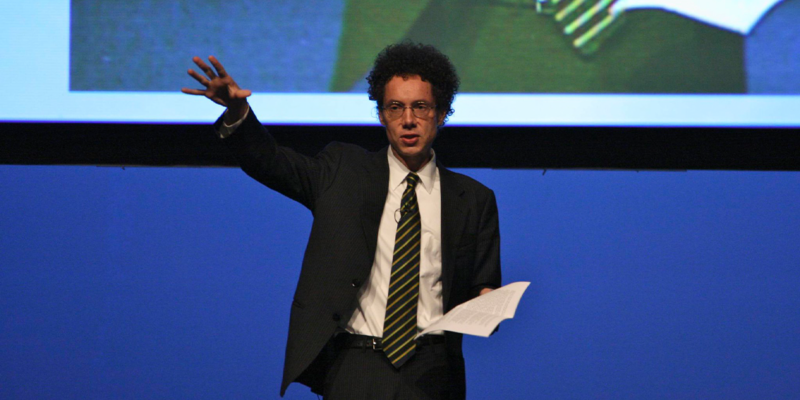Joe Theismann Kicks Off InfoComm AVEC
 One day when Joe Theismann was at football player at Notre Dame, the coaches called him into their office and asked how to pronounce his name. Joe said it was pronounced “Thees-man,” with the first syllable rhyming with “knees.” Notre Dame publicity manager Roger Valdiserri told him from then on his name would be pronounced “Theismann,” so the first syllable sounded like “thigh,” therefore rhyming with Heisman — as in Heisman Trophy, the prestigious award given each year to the most outstanding college football player.
One day when Joe Theismann was at football player at Notre Dame, the coaches called him into their office and asked how to pronounce his name. Joe said it was pronounced “Thees-man,” with the first syllable rhyming with “knees.” Notre Dame publicity manager Roger Valdiserri told him from then on his name would be pronounced “Theismann,” so the first syllable sounded like “thigh,” therefore rhyming with Heisman — as in Heisman Trophy, the prestigious award given each year to the most outstanding college football player.
Theismann recounted this story, as well as other anecdotes from his time at Notre Dame and as quarterback for the Washington Redskins, in his opening keynote speech last week at InfoComm’s AV Executive Conference (AVEC) in Amelia Island, Florida. The takeaway from that anecdote was that adaptability is important in life and in business — as evidenced by the fact that he’s known even today as Joe Theismann, whose last name rhymes with Heisman (a trophy that he never actually did win).
Theismann is probably most famous for the play that ended his football career, when he was sacked by New York Giants linebacker Lawrence Taylor and suffered a grisly compound fracture of his leg live on television in November 1985. He told the audience about how he was making $1 million a season at the time, a huge sum in the mid ‘80s. The NFL Players’ Union had negotiated a deal where if a player was injured and couldn’t play, the league owed the player half of his pay — but at a maximum of $65,000. He was only 36 at the time, with a family to support, and took a $935,000 pay cut.
When he got hurt, Theismann said he “got real introspective.” He was tired of people saying he was egotistical and arrogant, and he also didn’t like who he was as a person. He was mean, he said. Theismann thought not only about what he wanted to do, but who he wanted to be.
He decided he wanted to be an excited student, and to educate himself. He wanted to learn more every day. He also took what he learned in sports and applied it to life and to business. For example, Theismann said, in sports, you write everything down, especially your goals. He advised everyone in the audience to take a pen in hand and actually write down what they hoped to achieve in the next year — professionally, personally, spiritually and financially. The act of writing down goals will make a surprising difference. (He then advised Cleveland Browns fans to write down, “We will win at least six games this season,” but that it would probably not make a difference.)
He also has learned that some of the simplest — though not necessarily the easiest — are the most important, in particular — showing up to work. Theismann said of all the things he’s accomplished in his career, he’s most proud of the fact that at one point, he played in 163 consecutive games. He emphasized the importance of showing up to work every single day and that makes a huge difference in getting better, getting smarter.
Theismann also said that creating opportunity for yourself is the first thing you have to do. When he first went to Notre Dame in 1967, he was one of 13 quarterbacks that were coming to fight for the starting position. He wasn’t anything special, and he was of average height and build compared to some of the other guys. But he did decide to show up a week early so he could learn their plays and by the time the other guys got there, he had an edge on them. He created the opportunity for himself. After opportunity, you then need talent and/or hard work to actually succeed.
Joe Theismann was an inspirational and surprisingly funny way to kick off the AVEC conference. He looked around the room and said, “No one in here is average. Every single one of you is a champion. What price are you willing to pay to be special?”





